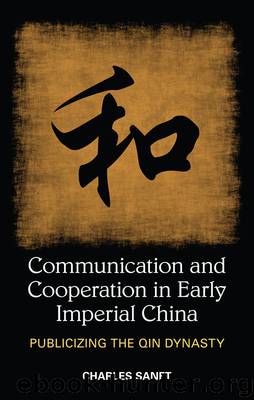Communication and Cooperation in Early Imperial China by Sanft Charles

Author:Sanft, Charles
Language: eng
Format: epub
Publisher: State University of New York Press
Published: 2013-03-15T16:00:00+00:00
The Function of Household Registration
There are a number of explanations for the existence of household registration in early imperial China. The variety of proposed functions reflects the broad and varied utility that information about a populace has for its rulers. Without rejecting these explanations, I want to add another layer of interpretation by considering the way these systems worked as means of communication that helped create cooperation and integration at the national level. I have already mentioned the specific and exceptional case of Han founder Liu Bang’s proclamation suspending punishment for those who had avoided registration as a form of communication. I argue that the system in its normal functioning had similar effects. Previous studies of early Chinese bureaucracy have focused on information flows directed upward in the hierarchy, without considering how collecting that information and related processes themselves served to communicate. The development of bureaucratic practices traced a trajectory toward closer contact with the people of the realm, and registration was one medium for this.
Modern scholars, beginning at least with Ikeda On, have also explained the system of household registration as a means to control the population.30 Many integrate this general control function with a group of similar other demands, typically taxation, labor, and military service.31 Some focus on different aspects of this or related matters. Tu Mingfeng 涂明鳳, for example, says the registration worked both to control and to harmonize the population, to control their movements and maintain security.32 Beyond control and extracting taxes and labor service, Han Lianqi 韓連琪 says registration served to connect the peasantry to the land. But he also astutely notes that even as demands for labor were decreasing under the early Han government, the rulers continued to emphasize registration.33 Similarly, the abolishment of compulsory military service in the first century CE was not accompanied by a corresponding change to the system of registration.34 This suggests other factors were—or had become—more important.
Du Zhengsheng considers the registration system a means for controlling human resources and extracting labor and taxes. But he also notes that registration was part of a shift away from lineage-based social organization. The new system created and maintained direct links between the state and the population. The result was—at least in theory—direct control of the people by the central government, without mediating groups or structures. Du portrays this as part of a broad shift toward all members of the population being politically equal before the state, no longer as units in a lineage. Wan Changhua 萬昌華 and Zhao Xingbin 趙興彬 follow Du to link registration systems to the control of individual persons and the associated attenuation of lineage groups. They expand this idea within the context of conquest and argue the Qin used household registries as a means to take new populations under control. They also note that states other than Qin did not so strictly control their populations.35
At the same time, there are indications that Qin control of its population was in fact not as strict as the statutes would indicate.
Download
This site does not store any files on its server. We only index and link to content provided by other sites. Please contact the content providers to delete copyright contents if any and email us, we'll remove relevant links or contents immediately.
| Africa | Americas |
| Arctic & Antarctica | Asia |
| Australia & Oceania | Europe |
| Middle East | Russia |
| United States | World |
| Ancient Civilizations | Military |
| Historical Study & Educational Resources |
The Sympathizer by Viet Thanh Nguyen(4393)
The Rape of Nanking by Iris Chang(4214)
World without end by Ken Follett(3478)
Ants Among Elephants by Sujatha Gidla(3467)
Blood and Sand by Alex Von Tunzelmann(3205)
Japanese Design by Patricia J. Graham(3178)
The Queen of Nothing by Holly Black(2600)
City of Djinns: a year in Delhi by William Dalrymple(2555)
Foreign Devils on the Silk Road: The Search for the Lost Treasures of Central Asia by Peter Hopkirk(2465)
India's Ancient Past by R.S. Sharma(2456)
Inglorious Empire by Shashi Tharoor(2443)
Tokyo by Rob Goss(2432)
In Order to Live: A North Korean Girl's Journey to Freedom by Yeonmi Park(2392)
Tokyo Geek's Guide: Manga, Anime, Gaming, Cosplay, Toys, Idols & More - The Ultimate Guide to Japan's Otaku Culture by Simone Gianni(2373)
India's biggest cover-up by Dhar Anuj(2355)
The Great Game: On Secret Service in High Asia by Peter Hopkirk(2349)
Goodbye Madame Butterfly(2254)
Batik by Rudolf Smend(2185)
Living Silence in Burma by Christina Fink(2072)
